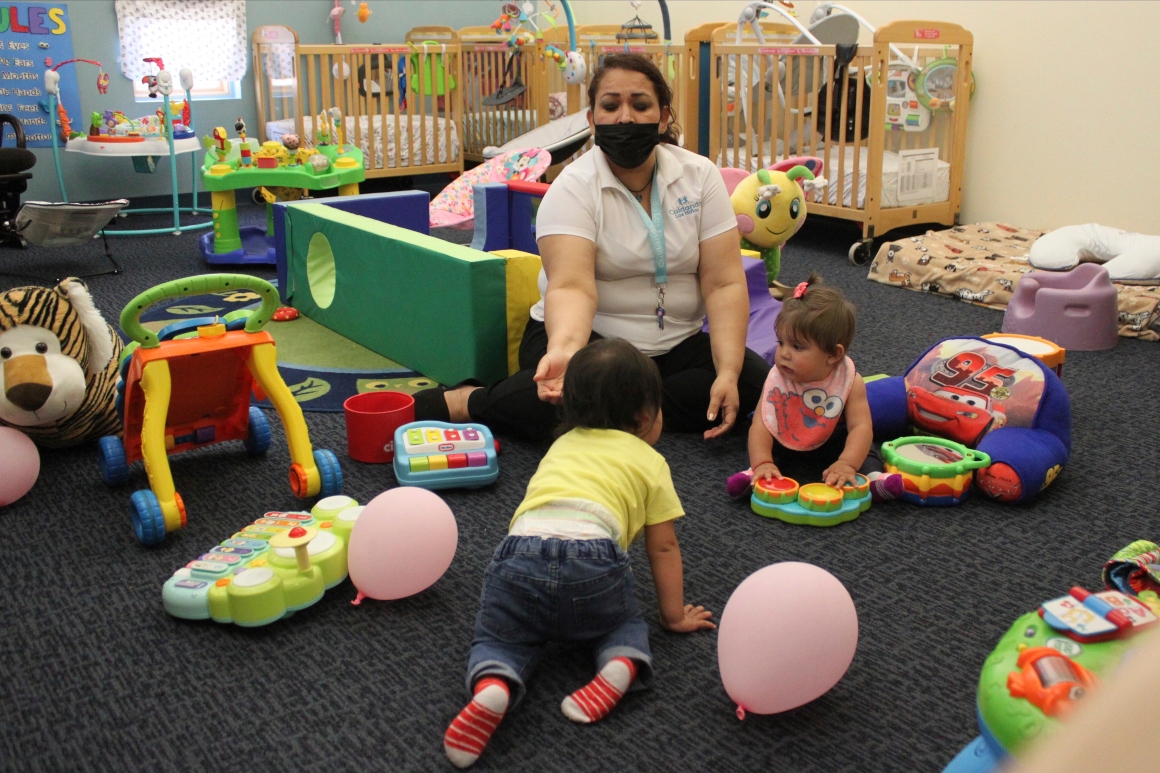
As Democrats in Congress struggle to deliver on their campaign promises to working parents, their counterparts on the state level are picking up the mantle.
From Connecticut to New Mexico, progressive elected officials in recent months have moved to defray the high cost of child care, create paid leave programs for new parents or those caring for loved ones, and salvage other parts of the Democratic agenda at risk of dying from inaction in Congress as November’s midterm elections get closer.
“It was disappointing the Senate couldn’t make it happen,” Vasu Reddy, senior policy counsel for the National Partnership for Women & Families, said of previous budget reconciliation negotiations. But “the momentum from the states has picked right back up.”
Within weeks of one another this spring, the neighboring state legislatures in Maryland and Delaware passed bills to establish paid family leave programs in their states. The Maryland General Assembly overrode GOP Gov. Larry Hogan’s veto, while Delaware’s measure was signed by Democratic Gov. John Carney on Tuesday, though both laws will not go into full effect for several years.
While Democrats have spearheaded the state efforts, Republicans have dialed back their opposition to some family aid initiatives.
Democratic state Sen. Sarah McBride, who sponsored the Delaware bill, said momentum for the legislation had been building for years as other states set up such programs. Delaware is the 11th state, plus Washington D.C., to enact paid leave laws.
However, the Delaware drive was “supercharged” during the pandemic, McBride added, and as advocates rallied behind the now-scuttled Build Back Better reconciliation package in Congress, which would have offered workers nationally up to 12 weeks of paid family and medical leave.

“It really showed Democrats across the country that this is a policy that the public demands, and that if this doesn’t end up in a package passed by Congress the states should take the lead forwarding the Democratic agenda,” McBride said.
States elsewhere — their budget coffers flush with tax receipts due to the rebounding economy and federal money via last year’s American Rescue Plan — have sought to devote some of that windfall to plugging longstanding gaps in the child care system.
In New York, Democrats boosted the share of the state budget devoted to child care by roughly $146 million over the prior fiscal year, bringing the total funding up to about $1.3 billion.
Additionally, the state is boosting how generous child care subsidies are and expanding eligibility to families higher up the income-distribution ladder, allowing those earning up to three times the federal poverty level — or $83,250 for a family of four — to qualify. That's up from double the federal poverty level, according to Dede Hill, policy director for the Albany-based Schuyler Center.
Hill said 260,000 children could newly benefit from the expansion.
New York leaders have committed to spending about $7 billion over four years on child care, but that is contingent on a mix of state and federal funding.
“The reality for New York, as the federal stimulus funds begin to be fully utilized, it means that it will have to make a larger state commitment to sustain this investment,” Hill said.
Some states have likewise opted to make splashy investments that can appeal to voters but come with no long-term guarantee. That approach keeps their budgetary outlays in check but carries the risk that benefits will lapse or expire just as people get accustomed to them — as recipients of the expanded federal Child Tax Credit learned.
Connecticut lawmakers this month advanced a state budget that includes a one-time rebate of $250 per child — up to $750 — at a cost of roughly $125 million, as part of a suite of tax changes that also enhanced the state’s version of the Earned Income Tax Credit.
Beyond the Atlantic seaboard, New Mexico's Democratic Gov. Michelle Lujan Grisham late last month announced the state would cover the cost of child care for families making less than four times the federal poverty level.
The initiative started May 1 and runs through next June. New Mexico already offered the most generous child care subsidies in the country, but the new effort builds on that by waiving co-pays — potentially saving hundreds of dollars a month per child for families. Previously, only those making twice the federal poverty level or less had their co-pays waived.
New Mexico is covering the $40 million price tag using its federal pandemic relief allotment, and the administration is exploring ways to fund the program beyond its initial implementation.
While much of the movement has been in state governments controlled by Democrats, there are signs that the issue is starting to resonate across party lines.
Republican Virginia Gov. Glenn Youngkin in April signed paid leave legislation passed overwhelmingly by the General Assembly — which is split with Democrats controlling the Senate and the GOP holding a majority in the lower chamber.
That law, which takes effect in July, authorizes insurance companies to offer policies that employers can purchase covering paid leave benefits for their workers. It was backed by the life insurance lobby and business groups as a market-based alternative to the approach taking root elsewhere, and it includes neither an employer mandate nor a payroll tax.
Yet the proliferation of paid leave laws — each with their own setups and requirements — has frustrated companies that do business in more than one state.
"Different states bringing online all these different programs is really creating administrative burdens and nightmares for companies operating nationally, or just across several states," said Marc Freedman, the U.S. Chamber of Commerce's vice president for employment policy. "This patchwork effect is a real problem.”
Advocates continue to grapple with how best to sell their pitches to conservative lawmakers in purple and red states on issues like child care and early development.
“The clear message we have gotten from Republicans over the years is they’re not hearing from business leaders, they’re not hearing from parents, that child care is a critical issue,” said Ruth Schmidt, the executive director of the Wisconsin Early Childhood Association.
Schmidt said they have sought to change that by increasing outreach to businesses and community leaders, using the pandemic experience as a springboard to winning them over.
“Business definitely gets this issue in a way I don’t think they did before,” she said. “They’re getting a better sense of why the economics of child care does not work in the current structure, and how that leads to this huge, gaping hole in affordable care in communities.”
Still, she conceded that the question of who pays for everything remains an impediment to turning that conceptual alignment into a winning message.
“We just have to completely change the dialogue and make the dollars and cents make sense” in states like Wisconsin, Schmidt said.
But even as more states make headway on these types of issues and millions of people stand to benefit, advocates say the need for Congress to act remains.
“For people in states that have legislatures hostile to paid leave, they still need that leave,” Reddy said. “They are impacted by the federal government not getting this done. Your ability to take care of your family without going broke shouldn’t depend on where you live.”
----------------------------------------
By: Nick Niedzwiadek
Title: States pick up tatters of Democrats' paid leave, child care agenda
Sourced From: www.politico.com/news/2022/05/12/states-democrats-paid-leave-child-care-00031294
Published Date: Thu, 12 May 2022 03:30:00 EST






